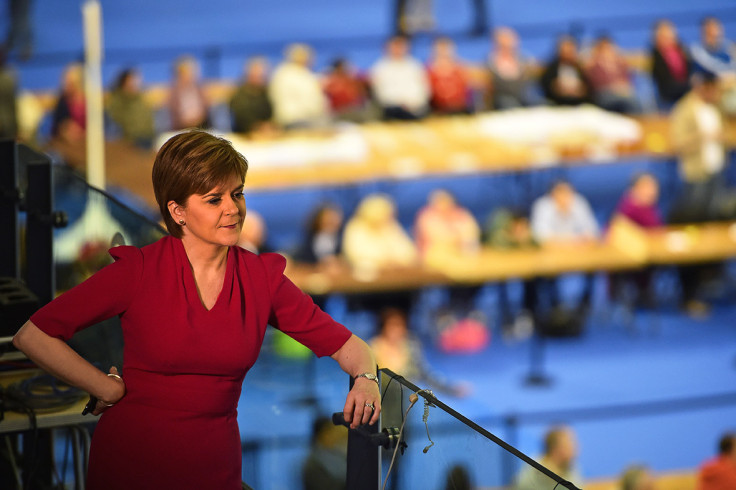The SNP can teach Lib Dems a thing or two about getting back in the game
Tim Farron is talking up the parallels with Scotland, where SNP jumped from 6 seats to 56 post-referendum.

Hello England, it's Scotland here. Welcome to post-referendum politics.
The result of the Richmond by-election after the Lib Dems successfully turned it into a vote on Brexit confirms that, just as in Scotland since 2014, there are new battle lines in politics. For now, left and right – positions largely based on a differing approach to economics – are less important than In and Out, or Yes and No.
The parallels with what's occurred in Scotland since the independence referendum there in 2014 are striking. For example, the winning candidate in Richmond, Sarah Olney, only joined the Liberal Democrats last year after the party's hammering at the general election.
A number of the SNP's current MPs were first drawn into politics by the independence vote and only joined the party after they'd lost that poll. In the space of just a few years Tommy Sheppard has joined the SNP, become one of the party's more widely respected MPs and run for deputy leader of the party. This from a man previously a high-profile Labour member and organiser who knocked about with Jeremy Corbyn when both sat on East London councils.
Richmond showed that, in post-referendum politics, there's no such thing as the personal vote.
A senior Lib Dem I spoke to ahead of the by-election feared Zac's "yummy mummy fan club" in Richmond would swing it for him. He clearly wasn't paying close enough attention to Scotland.
You'll struggle to find anyone with a bad word to say about people like the Lib Dems' Michael Moore or Labour's Anne Begg, and yet they were swept aside in 2015 as the SNP wave carried (nearly) all before it.
If politics is being fought at the centre and the argument is over essentially minor differences in how to manage the economy, then a personal vote can come into play. But if folk feel they are voting about fundamental issues about the future of the country, forget it.
So what can England look forward to? There are pointers in Scotland.
The Tories will not be shaken by the Richmond by-election, in fact they'll be quite pleased. Bear in mind technically they didn't even lose the election, Zac Goldsmith was standing as an independent.
But if the division is now between Leavers and Remainers, the Conservatives are clearly on the Leave side of that equation, even if not all of their MPs are enthusiastic about that.
Just as in Scotland Ruth Davidson ruthlessly exploited perceived Labour wobbles to position her team as the party of the union, the Conservatives in England can go into an election as the Leave party, confident of victory.
One estimate puts the figure at upwards of 420 Leave seats – a comfortable May majority. Smart Ukip voters – if that's not a contradiction in terms – will surely swing behind the Tories in any tight contests.
In Scotland the No vote splintered. A bit more co-ordination in 2015 could've disrupted the SNP's advance. If, for example, the Tories had kept out of the way in East Dunbartonshire in return for the Lib Dems not really trying in Berwickshire, Jo Swinson and John Lamont could conceivably have made it to Westminster. Both parties have learned from that experience.
Only Ian Murray managed to marshal a No coalition in his Edinburgh South seat to see him home as Scottish Labour's last man standing.
Which is why if he'd any sense Jeremy Corbyn would be pumping Murray for information on how to survive the post-referendum landscape. But he's not. Instead Murray moulders on the backbenches and Labour are looking at a similar outcome nationwide to their Scottish situation, where they have been sidelined to the extent that many now ask what's the point of the party at all.
There is an upside for a handful of Labour MPs. The likes of Helen Hayes in Dulwich and Lucy Powell in Manchester for example could comfortably and confidently go into a general election talking up their Remain credentials, ignoring whatever crackpot manifesto the Corbyn leadership ultimately dreams up.
And it's good news for all those Lib Dems who lost their seats at the last election. This morning they'll be drawing up spreadsheets and Venn diagrams charting which seats have the highest Remain votes and the most unwell MPs before fanning out across the country in a mass carpet-bagging operation.
Farron is already talking up the parallels with Scotland, where the SNP jumped from six seats to 56 off the back of a referendum.
If he's really been studying the ramifications of that, expect Lib Dem candidate vetting to be stepped up. The SNP have suffered a little from candidates they weren't expecting to get elected actually now being MPs. It's a drain on party staff's time finding foreign jollies on which to send the more excitable among the 56 in order to keep them out of trouble.
The so-called experts who failed to spot the various political upheavals in 2016 might scoff at Farron's dream. But as long as it looks like his party is the quickest to adapt to the new landscape – drawing on its experience in 2014-15 – the Lib Dems could be back in the big time quicker than anyone expected.
James Millar is a freelance political commentator, author and former Westminster correspondent for the Scottish Sunday Post newspaper. He tweets at @PoliticalYeti
© Copyright IBTimes 2024. All rights reserved.






